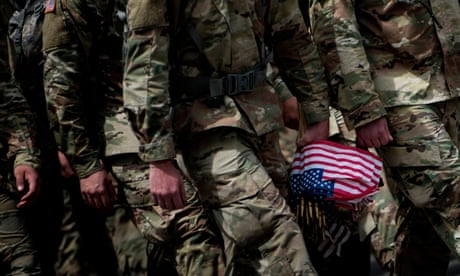US military
The 20-year-old soldier said she was being sexually harassed by superiors before her dismembered body was found in Texas
Shilpa Jindia Tue 14 Jul 2020

Offerings sit in front of a mural of the slain army specialist Vanessa Guillén painted on a wall in the south side of Fort Worth, Texas. Photograph: LM Otero/AP
The disappearance and killing of soldier Vanessa Guillén has gripped Texas, and reignited widespread outrage over sexual violence in the US military and the failures of recent reforms to address it.
Guillén, 20, disappeared from the Fort Hood military base in Killeen on 22 April. After over two months in which hundreds of people searched for her across large parts of central Texas, remains were found in late June, and were later identified as Guillén’s.

Military sexual assaults jump by 37%, anonymous survey shows
Read more https://www.theguardian.com/us-news/2019/may/02/unreported-military-sexual-assaults-jump-by-37-anonymous-survey-shows
As her family publicly pressed for answers, the army announced that a suspect, soldier Aaron David Robinson, died on 1 July by suicide as law enforcement pursued him. Robinson’s girlfriend Cecily Aguilar, a civilian, was arrested and later charged with conspiracy to tamper with evidence.
The Department of Justice released a criminal complaint alleging that Robinson had murdered Guillén at the base, then dismembered and buried her body near the Leon River, with Aguilar’s help. Guillén’s family say they learned what allegedly happened to Vanessa as the public did.
Aguilar appeared in court earlier this month but did not make any statement other than to acknowledge the charges against her. She did not enter a plea.
Many questions remain unanswered about the events leading up to Guillén’s death. She told family and friends that she was being sexual harassed by two different soldiers who outranked her, including Robinson, but never formally reported the allegations, fearing retaliation.
A lawyer for the Guillén family told the Houston Chronicle that they provided Robinson’s name to authorities. “We believe that Vanessa told him that she was reporting him, and that’s why he bludgeoned her,” said the Guillén family attorney, Natalie Khawam. She has said that if Guillén had felt able to come forward before, she might still be alive today.
About one in three service members report sexual assault, according to the defense department. Last year, 6,236 reports of sexual assault were filed with the department’s sexual assault prevention and response office, which was established in 2005. The vast majority were women aged 17 to 24, like Guillén.
Guillén’s disappearance prompted protesters to march in the streets across major cities in Texas over Independence Day weekend, before her remains were found. The hashtag #IAmVanessaGuillen spread across social media as service members shared stories of sexual violence and harassment in a #MeToo reckoning for the military, as the country also grapples with the wider indictments of systemic racial discrimination and injustice following the killing of George Floyd.
The disappearance and killing of soldier Vanessa Guillén has gripped Texas, and reignited widespread outrage over sexual violence in the US military and the failures of recent reforms to address it.
Guillén, 20, disappeared from the Fort Hood military base in Killeen on 22 April. After over two months in which hundreds of people searched for her across large parts of central Texas, remains were found in late June, and were later identified as Guillén’s.

Military sexual assaults jump by 37%, anonymous survey shows
Read more https://www.theguardian.com/us-news/2019/may/02/unreported-military-sexual-assaults-jump-by-37-anonymous-survey-shows
As her family publicly pressed for answers, the army announced that a suspect, soldier Aaron David Robinson, died on 1 July by suicide as law enforcement pursued him. Robinson’s girlfriend Cecily Aguilar, a civilian, was arrested and later charged with conspiracy to tamper with evidence.
The Department of Justice released a criminal complaint alleging that Robinson had murdered Guillén at the base, then dismembered and buried her body near the Leon River, with Aguilar’s help. Guillén’s family say they learned what allegedly happened to Vanessa as the public did.
Aguilar appeared in court earlier this month but did not make any statement other than to acknowledge the charges against her. She did not enter a plea.
Many questions remain unanswered about the events leading up to Guillén’s death. She told family and friends that she was being sexual harassed by two different soldiers who outranked her, including Robinson, but never formally reported the allegations, fearing retaliation.
A lawyer for the Guillén family told the Houston Chronicle that they provided Robinson’s name to authorities. “We believe that Vanessa told him that she was reporting him, and that’s why he bludgeoned her,” said the Guillén family attorney, Natalie Khawam. She has said that if Guillén had felt able to come forward before, she might still be alive today.
About one in three service members report sexual assault, according to the defense department. Last year, 6,236 reports of sexual assault were filed with the department’s sexual assault prevention and response office, which was established in 2005. The vast majority were women aged 17 to 24, like Guillén.
Guillén’s disappearance prompted protesters to march in the streets across major cities in Texas over Independence Day weekend, before her remains were found. The hashtag #IAmVanessaGuillen spread across social media as service members shared stories of sexual violence and harassment in a #MeToo reckoning for the military, as the country also grapples with the wider indictments of systemic racial discrimination and injustice following the killing of George Floyd.

Protesters gather at a march and vigil for Vanessa Guillen on 12 July in Austin, Texas. Photograph: Sergio Flores/Getty Images
Guillén’s family pushed relentlessly for answers in their search for Vanessa.The family have now renewed their calls to shut down Fort Hood, as well as for a congressional investigation into the base and new legislation to create an independent agency for soldiers to report sexual harassment and violence.
“They lied to us since day one,” Mayra Guillén, Vanessa’s sister, said in an anguished press conference last week.
More 4,000 women and non-binary veterans and active duty members have signed a petition directed at the leaders of Department of Defense and congressional leadership supporting the family’s calls.
“We are Vanessa Guillén, that’s our story too, it could have easily been any one of us,” said Tristeza Ordex, a retired marine corps staff sergeant who helped start the letter along with Pam Campos-Palma, a former intelligence analyst and community organizer.
“Her story, what happened to her, really resonates for me because, she’s a Mexican American woman that lost her life, and that could have easily been me with the things that I went through, the sexual harassment, the attempts of assault, and dealing with the chain of command where you try to report things.”
The letter also demands the immediate relief and replacement of Guillén’s chain of command, up to and including the commanding general of Fort Hood, and a boycott on enlistment until systemic rape culture is addressed.
The US army is assembling a civilian review panel of consultants to review the “command climate and culture” at Fort Hood, the army secretary, Ryan McCarthy, announced last week.
“The purpose of this independent review is to determine whether the command climate and culture at Fort Hood and the surrounding military community reflects the army’s values including respect, inclusiveness and workplaces free from sexual harassment, and the commitment to diversity,” a statement said. Several other investigations into conduct at Food Hood are also under way, including one examining the allegations that Guillén was sexually harassed, and another on the support given to those who report sexual harassment and sexual assault.

The Fort Hood army base near Killeen, Texas. There have been several unsolved deaths or disappearances at the base. Photograph: Jack Plunkett/AP
One of the largest military bases in the world, Fort Hood has been criticized for failing to protect soldiers in the past. In 2015, a sergeant with the base’s sexual assault reporting unit – which Guillén would have reported to had she lodged a complaint – pleaded guilty to running a prostitution ring with vulnerable young soldiers.
“It’s like a fox in the hen house,” Khawam told the Guardian. “This is an epidemic in our military system, in our culture. It’s cultivated in that place.”
In the course of the search for Guillén, investigators also found the remains of another missing Fort Hood soldier, Private Gregory Morales, who disappeared last August, one of several unsolved deaths and disappearances at the base.
Almost 90 lawmakers have signed a letter spearheaded by the Texas representative Sylvia Garcia calling for the defense department’s inspector general to investigate Guillén’s disappearance at Fort Hood.
But survivors and advocates already know the limits of congressional advocacy. Awareness and outrage over sexual violence in the military grew after the 2012 documentary Invisible War. However, efforts to pass legislation reforming military justice faltered over a debate about commanders’ roles in prosecuting sexual assault.
In 2013, Senator Kirsten Gillibrand introduced the Military Justice Improvement Act, which would give independent military prosecutors outside the chain of command control over sexual assault cases. Soldiers cannot sue the military for harm, and have little recourse aside from reporting up the chain of command.
Rep. Sylvia Garcia(@RepSylviaGarcia)
Vanessa Guillen and her family were failed.
I thank all my colleagues in Congress who have reached out about this case and who are ready to help.
Together, we must ensure the Guillen family gets #JusticeForVanessa and that this never happens again.#IAmVanessaGuillen pic.twitter.com/7tPsFCKtdRJuly 2, 2020
While the bill received bipartisan support, Gillibrand encountered resistance from within her own party. The then senator Claire McCaskill offered her own legislation proposing many of the same reforms, but kept power within the chain of command, deferring to tradition. McCaskill, a former sex crimes prosecutor, found herself labeled as the roadblock to the most significant piece of congressional legislation challenging rape culture in the military.
Though Congress criminalized retaliation, among a number of reforms, it remains a significant barrier to reporting in the fraternal world of the military. Service members who report sexual harassment or assault risk ostracism and their career. The defense department was able to substantiate only one of the 129 retaliation cases it investigated in 2018, and 64% of service members surveyed said they experienced retaliation for reporting assault. Sixty-six per cent of retaliation reports allege that retaliators were in the soldier’s chain of command. “When the chain of command tries to be the one that’s involved, it’s like the police policing itself,” said Ordex.
“If there’s not actual accountability for those actions, then the fact that things have changed a little bit on the books doesn’t change the culture at all,” said attorney Sara Darahshouri, who wrote two reports on retaliation for sexual assault crimes in the military while senior counsel at Human Rights Watch. “As a symbolic gesture, it made sense. But the problem is you could always have punished for retaliation.”
The Guillén family plans to lead a peaceful protest in Washington DC, on 30 July, when they will present their proposed bill to lawmakers. “That’s the stage that the family needs,” Ordex said.
“She wanted to be a part of something that was bigger than herself. And what ended up happening is that this amazing and beautiful family gave this beautiful girl to this country, and they chewed her up and spit her out like she was garbage.”
No comments:
Post a Comment